译林版(2019) 选择性必修第一册 Unit 2 The Universal Language Integrated skills 课件(34张ppt)
文档属性
| 名称 | 译林版(2019) 选择性必修第一册 Unit 2 The Universal Language Integrated skills 课件(34张ppt) |
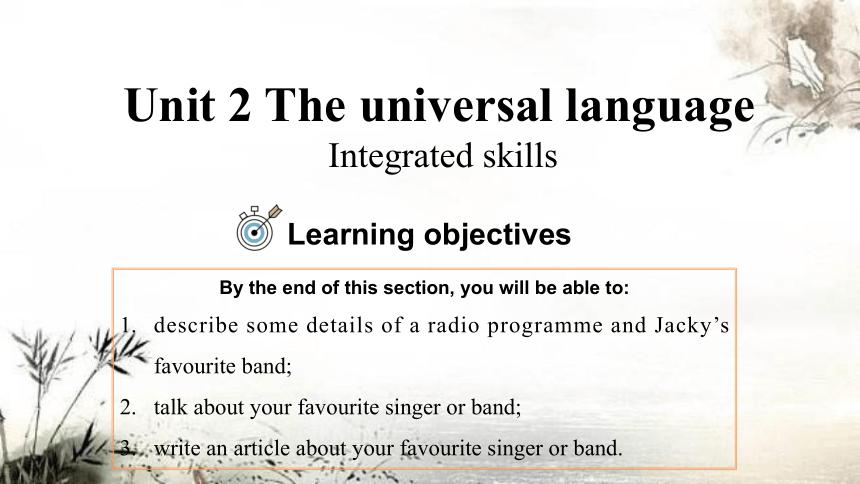
|
|
| 格式 | pptx | ||
| 文件大小 | 23.3MB | ||
| 资源类型 | 教案 | ||
| 版本资源 | 牛津译林版(2019) | ||
| 科目 | 英语 | ||
| 更新时间 | 2022-10-21 00:00:00 | ||
图片预览

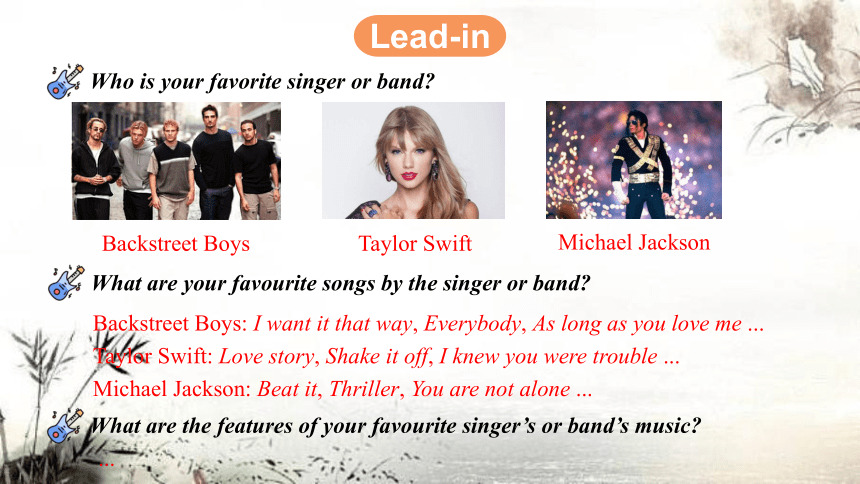
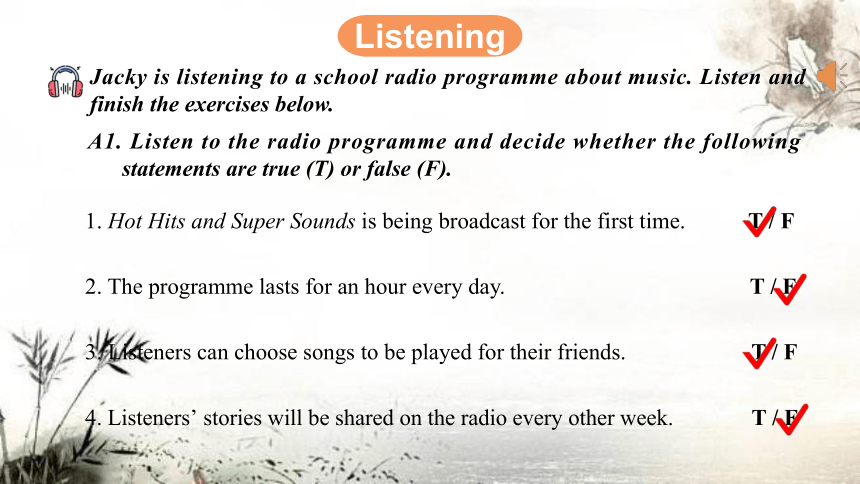
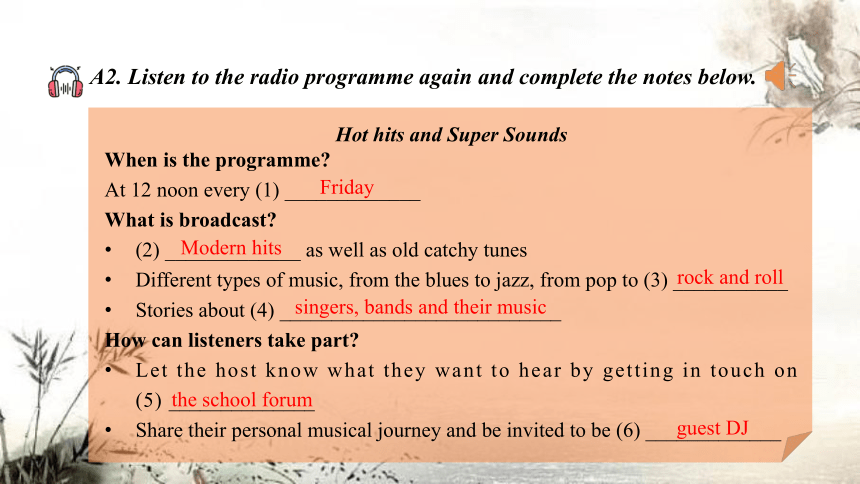
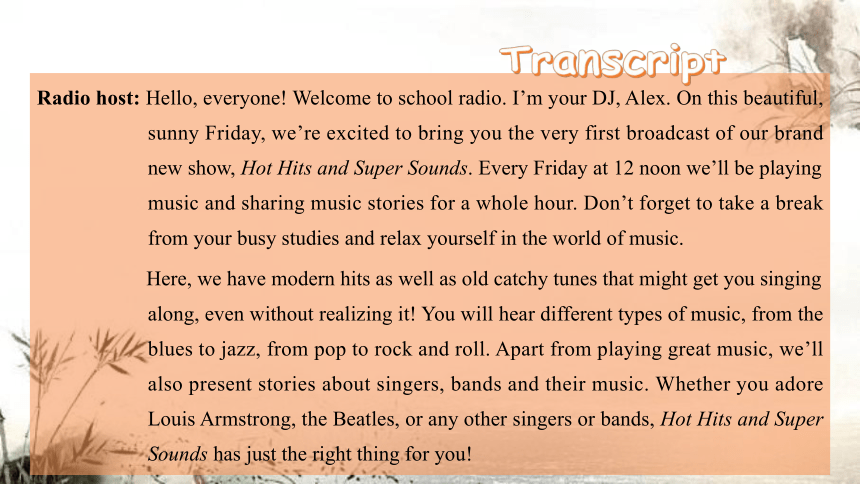
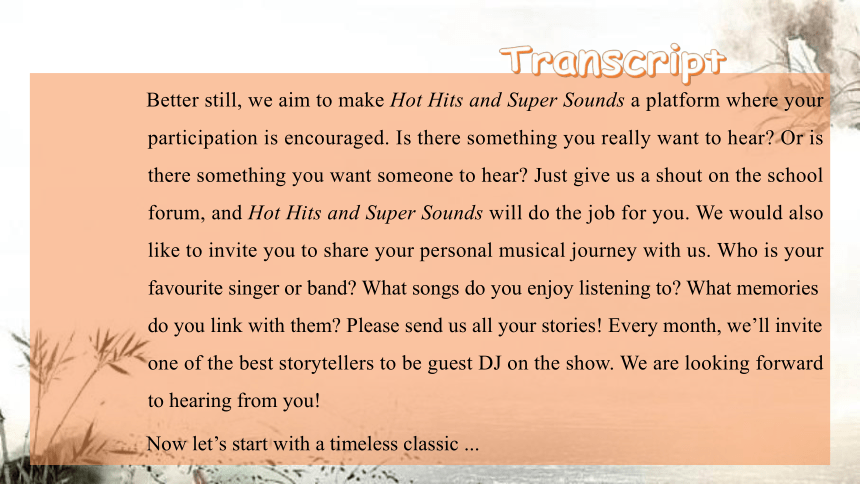
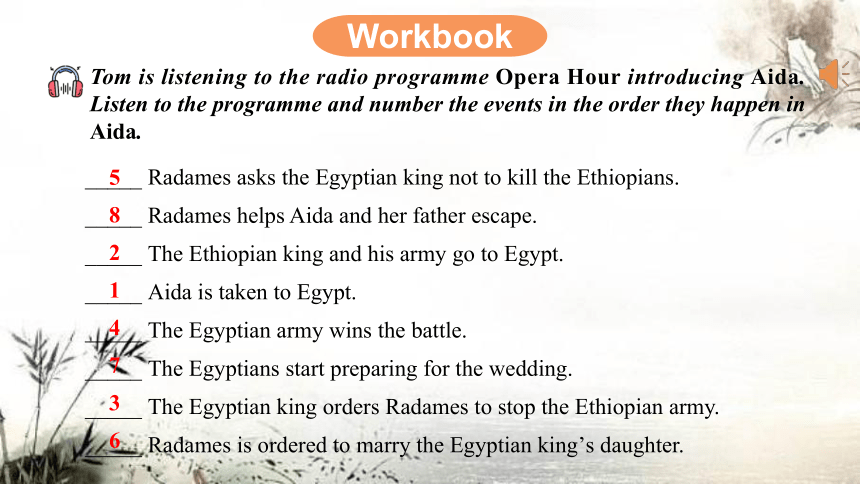
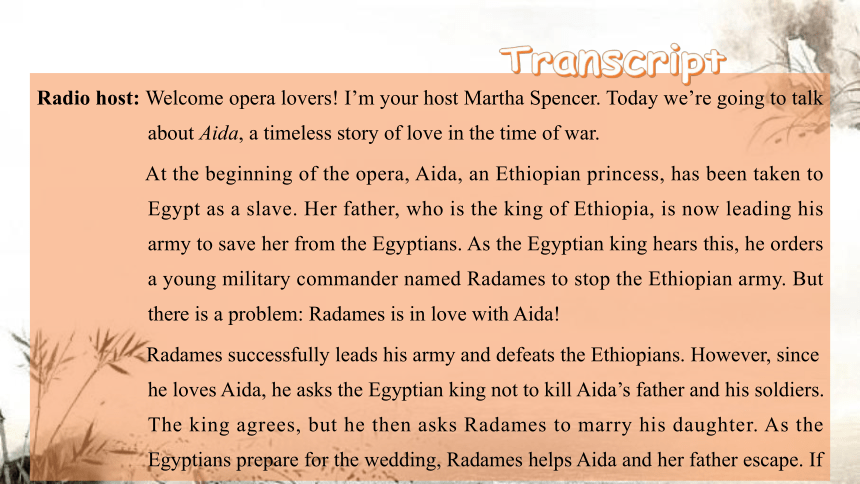
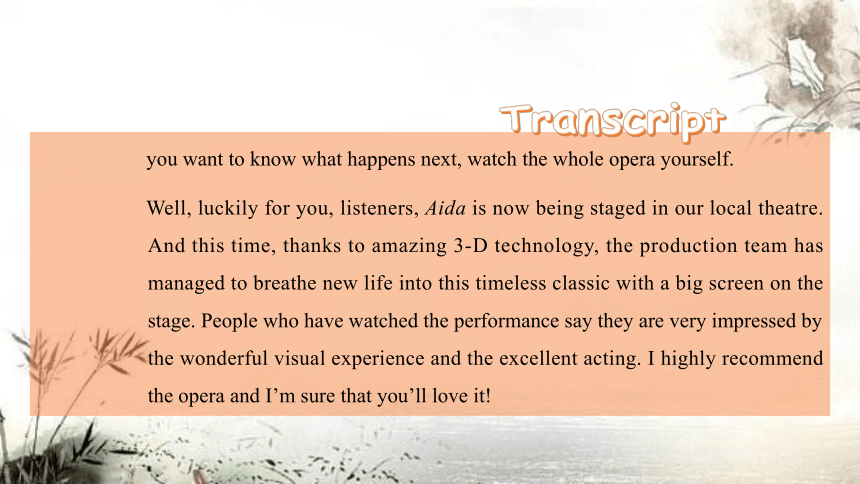
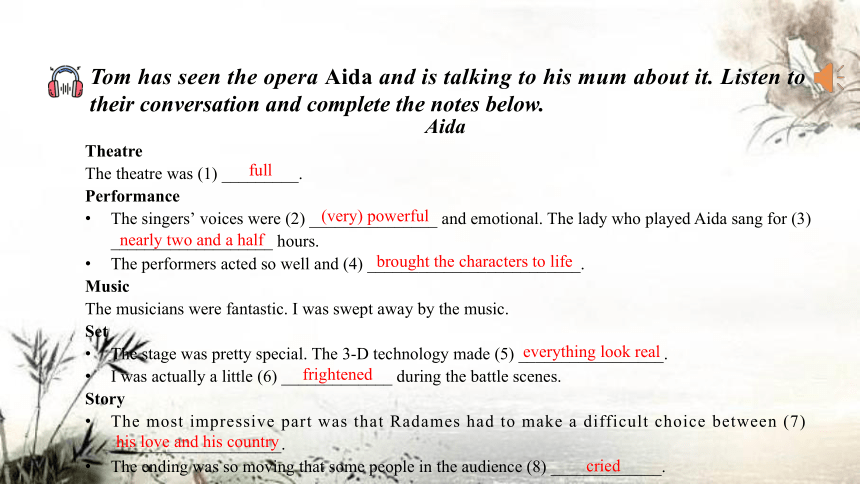
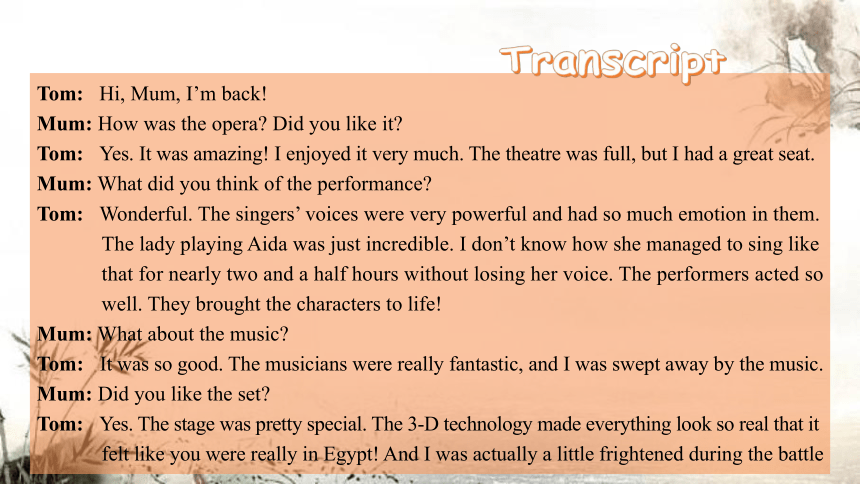
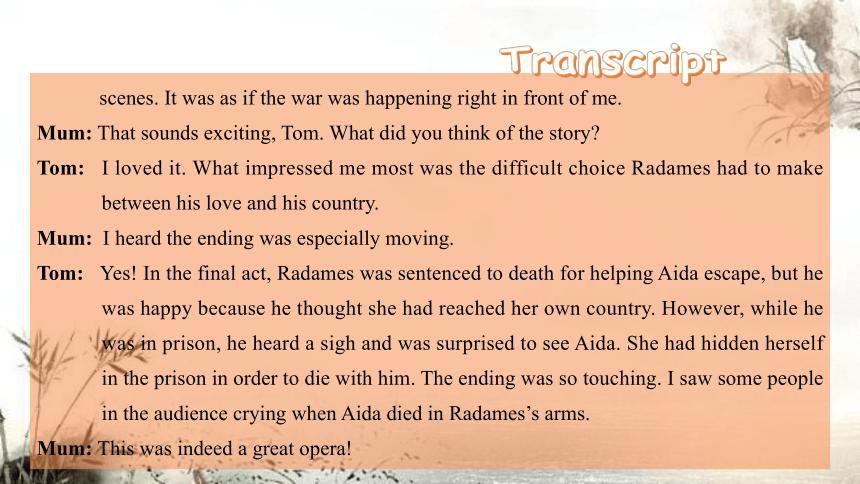
文档简介
(共34张PPT)
Learning objectives
By the end of this section, you will be able to:
describe some details of a radio programme and Jacky’s favourite band;
talk about your favourite singer or band;
write an article about your favourite singer or band.
Unit 2 The universal language
Integrated skills
Lead-in
Who is your favorite singer or band
Backstreet Boys
Taylor Swift
Michael Jackson
What are your favourite songs by the singer or band
Backstreet Boys: I want it that way, Everybody, As long as you love me ...
Taylor Swift: Love story, Shake it off, I knew you were trouble ...
Michael Jackson: Beat it, Thriller, You are not alone ...
What are the features of your favourite singer’s or band’s music
...
Listening
Jacky is listening to a school radio programme about music. Listen and finish the exercises below.
A1. Listen to the radio programme and decide whether the following statements are true (T) or false (F).
1. Hot Hits and Super Sounds is being broadcast for the first time. T / F
2. The programme lasts for an hour every day. T / F
3. Listeners can choose songs to be played for their friends. T / F
4. Listeners’ stories will be shared on the radio every other week. T / F
A2. Listen to the radio programme again and complete the notes below.
Hot hits and Super Sounds
When is the programme
At 12 noon every (1) _____________
What is broadcast
(2) _____________ as well as old catchy tunes
Different types of music, from the blues to jazz, from pop to (3) ___________
Stories about (4) ___________________________
How can listeners take part
Let the host know what they want to hear by getting in touch on
(5) ______________
Share their personal musical journey and be invited to be (6) _____________
Friday
Modern hits
rock and roll
singers, bands and their music
the school forum
guest DJ
Radio host: Hello, everyone! Welcome to school radio. I’m your DJ, Alex. On this beautiful, sunny Friday, we’re excited to bring you the very first broadcast of our brand new show, Hot Hits and Super Sounds. Every Friday at 12 noon we’ll be playing music and sharing music stories for a whole hour. Don’t forget to take a break from your busy studies and relax yourself in the world of music.
Here, we have modern hits as well as old catchy tunes that might get you singing along, even without realizing it! You will hear different types of music, from the blues to jazz, from pop to rock and roll. Apart from playing great music, we’ll also present stories about singers, bands and their music. Whether you adore Louis Armstrong, the Beatles, or any other singers or bands, Hot Hits and Super Sounds has just the right thing for you!
Transcript
Better still, we aim to make Hot Hits and Super Sounds a platform where your participation is encouraged. Is there something you really want to hear Or is there something you want someone to hear Just give us a shout on the school forum, and Hot Hits and Super Sounds will do the job for you. We would also like to invite you to share your personal musical journey with us. Who is your favourite singer or band What songs do you enjoy listening to What memories do you link with them Please send us all your stories! Every month, we’ll invite one of the best storytellers to be guest DJ on the show. We are looking forward to hearing from you!
Now let’s start with a timeless classic ...
Transcript
Workbook
Tom is listening to the radio programme Opera Hour introducing Aida. Listen to the programme and number the events in the order they happen in Aida.
_____ Radames asks the Egyptian king not to kill the Ethiopians.
_____ Radames helps Aida and her father escape.
_____ The Ethiopian king and his army go to Egypt.
_____ Aida is taken to Egypt.
_____ The Egyptian army wins the battle.
_____ The Egyptians start preparing for the wedding.
_____ The Egyptian king orders Radames to stop the Ethiopian army.
_____ Radames is ordered to marry the Egyptian king’s daughter.
1
2
3
4
5
6
7
8
Radio host: Welcome opera lovers! I’m your host Martha Spencer. Today we’re going to talk about Aida, a timeless story of love in the time of war.
At the beginning of the opera, Aida, an Ethiopian princess, has been taken to Egypt as a slave. Her father, who is the king of Ethiopia, is now leading his army to save her from the Egyptians. As the Egyptian king hears this, he orders a young military commander named Radames to stop the Ethiopian army. But there is a problem: Radames is in love with Aida!
Radames successfully leads his army and defeats the Ethiopians. However, since he loves Aida, he asks the Egyptian king not to kill Aida’s father and his soldiers. The king agrees, but he then asks Radames to marry his daughter. As the Egyptians prepare for the wedding, Radames helps Aida and her father escape. If
Transcript
you want to know what happens next, watch the whole opera yourself.
Well, luckily for you, listeners, Aida is now being staged in our local theatre. And this time, thanks to amazing 3-D technology, the production team has managed to breathe new life into this timeless classic with a big screen on the stage. People who have watched the performance say they are very impressed by the wonderful visual experience and the excellent acting. I highly recommend the opera and I’m sure that you’ll love it!
Transcript
Tom has seen the opera Aida and is talking to his mum about it. Listen to their conversation and complete the notes below.
Aida
Theatre
The theatre was (1) _________.
Performance
The singers’ voices were (2) _______________ and emotional. The lady who played Aida sang for (3) ___________________ hours.
The performers acted so well and (4) _________________________.
Music
The musicians were fantastic. I was swept away by the music.
Set
The stage was pretty special. The 3-D technology made (5) _________________.
I was actually a little (6) _____________ during the battle scenes.
Story
The most impressive part was that Radames had to make a difficult choice between (7) ____________________.
The ending was so moving that some people in the audience (8) _____________.
full
(very) powerful
nearly two and a half
brought the characters to life
everything look real
frightened
his love and his country
cried
Tom: Hi, Mum, I’m back!
Mum: How was the opera Did you like it
Tom: Yes. It was amazing! I enjoyed it very much. The theatre was full, but I had a great seat.
Mum: What did you think of the performance
Tom: Wonderful. The singers’ voices were very powerful and had so much emotion in them. The lady playing Aida was just incredible. I don’t know how she managed to sing like that for nearly two and a half hours without losing her voice. The performers acted so well. They brought the characters to life!
Mum: What about the music
Tom: It was so good. The musicians were really fantastic, and I was swept away by the music.
Mum: Did you like the set
Tom: Yes. The stage was pretty special. The 3-D technology made everything look so real that it felt like you were really in Egypt! And I was actually a little frightened during the battle
Transcript
scenes. It was as if the war was happening right in front of me.
Mum: That sounds exciting, Tom. What did you think of the story
Tom: I loved it. What impressed me most was the difficult choice Radames had to make between his love and his country.
Mum: I heard the ending was especially moving.
Tom: Yes! In the final act, Radames was sentenced to death for helping Aida escape, but he was happy because he thought she had reached her own country. However, while he was in prison, he heard a sigh and was surprised to see Aida. She had hidden herself in the prison in order to die with him. The ending was so touching. I saw some people in the audience crying when Aida died in Radames’s arms.
Mum: This was indeed a great opera!
Transcript
Reading
After listening to the radio programme, Jacky has found an article about his favourite band. Read the article and fill in the following table about its structure.
Part Paragraph(s) Main idea
1
2
3
Paras.1-2
Paras. 3
Paras. 4
The writer’s love for the Beatles
A simple introduction to the Beatles and their popularity
The writer’s star-struck journey with the Beatles and the Beatles’s influence on him
Read the article again and answer the following questions.
1. What does “Fab” mean And what does the “Fab Four” stand for Do you think this is a good title and why
“Fab” means “extremely good”. The “Fab Four” stands for the Beatles, which had four members. It shows the band enjoyed wide popularity and people loved them very much. In my opinion, it is a good title as it attracts readers’ attention, and it is closely related to the content of the article.
2. What do you know about the Beatles
Your show!
The Beatles
The Beatles were an English rock band, formed in Liverpool in 1960, which comprised John Lennon, Paul McCartney, George Harrison and Ringo Starr. They are regarded as the most influential band of all time and were integral to the development of 1960s counterculture and popular music’s recognition as an art form. In 1970, due to the difference of opinions, the Beatles announced their breakup. Before their breakup, the band had issued more than 20 albums.
Love Me Do, Abbey Road, Yesterday, Help, Hey Jude, Let It Be, Yellow Submarine
Songs:
3. Was the writer crazy about the band How do you know
Yes. In the article the writer said twice “I was their biggest fan”. He also described his star-struck journey in detail—he had every disc ever made by the Beatles in his collection.
4. Did the writer know the style of the band very well Why do you think so
Yes. When he heard a new song, he recognized the voice of the singer, and was aware of any changes to their normal style such as different beats and tunes. Since the writer could easily identify the changes of the style made by the band, it implies that he knew their style very well.
5. What does the band mean to the writer
The Beatles’s music has accompanied him throughout his life. It has helped him look to the future with expectation and now it helps him reflect on his life with quiet satisfaction.
Discussion
In pairs, talk about your favourite singer or band. Use the following questions and expressions to help you.
Who is your favourite singer or band
What do you like about the singer or band
What are your favourite songs by the singer or band How do you feel
when you listen to them
What are the highlights of the singer’s or band’s music career
Can you think of a memorable time when you listened to the singer’s or
band’s songs What was it like
In pairs, talk about your favourite singer or band. Use the following questions and expressions to help you.
Expressions
Asking for further information
Could you tell me more about ...
I wonder if you could say more about ...
I’d like to know more about ... Could you tell me something about that
I’m really interested in ... Could you tell me a little bit more
A: My favourite singer is Michael Jackson. Have you heard of him
B: Yes, I have! He is a world-famous singer.
A: Right. He started his music career at an early age and devoted his life to his music. He’s definitely the “King of Pop”!
B: I see. I’m really interested in how he got the title “King of Pop”. Could you tell me a little bit more
A: Of course. His music appealed to a wide range of audiences, so he gained generations of fans over the years, earning him the title of “King of Pop”.
B: That’s great! I know he created a lot of successful songs. Could you tell me more about them
Example
A: Sure. In 1982, he released the world’s bestselling album of all time, Thriller! It includes the popular songs “Billie Jean”, “Beat It” and of course “Thriller”.
B: I’ve heard “Beat It” before. The beat always gets the feet tapping.
A: Exactly! I still recall the first time I heard it. I felt amazed at the catchy signature sounds he’s famous for. My parents are big fans and we often sang and danced together to his songs. His music really connects generations together!
B: I guess that’s the power of the King of Pop.
Example
Writing
Write an article about your favourite singer or band. Use your ideas from part C and the information in parts A and B to help you.
Planning your writing
Learning about the structure
When writing an article about your favourite singer or band, you can follow the structure below:
Give some basic information of your favourite singer or band.
Introduce the features and influences of the singer’s or band’s music and explain why you like the singer or band.
Describe an unforgettable memory related to the singer or band. This can also be put at the beginning of your writing.
Write an article about your favourite singer or band. Use your ideas from part C and the information in parts A and B to help you.
Learning about the language
Use words about emotions to tell readers how you feel. Adjectives expressing positive feelings include amazed, delighted, joyous, overjoyed, cheerful, excited, satisfied, relieved, energetic, calm and peaceful. You might use such words as lonely, anxious, nervous, bored, depressed, frustrated, upset, worried and stressed when you describe how the music helps you get rid of negative feelings.
Planning your writing
Michael Jackson: King of Pop
One of the main reasons Michael Jackson became my favourite singer is his lifelong devotion to his music. At an early age, Michael recorded his first music album with his family band called the Jackson 5. That was in the 1960s and it was just the beginning for the “King of Pop”. At the age of thirteen, he began his journey to becoming a world-famous solo artist with a career of almost forty years.
As Michael developed over the years as a person, so did his music. He covered a wide range of music types and gained generations of fans. His stylish dance moves and unconventional fashion sense also influenced his music and fans greatly. Those who grew up with his music, like my parents, were overjoyed whenever his next album was released, because they knew it would set the next trend. His most successful album, Thriller,
Example
was released in 1982 and worldwide, is still the bestselling album of all time. It includes the popular songs “Billie Jean”, “Beat It” and of course “Thriller”. Besides his entertaining songs, I like Michael Jackson because his music and style are genuinely original and timeless.
I remember the first time I heard his music. I was six years old and playing in my room when I heard the first drum beats of “Beat It”. I ran into the living room and heard my parents singing at the top of their voices, and they were doing a strange dance: the moonwalk. I still recall feeling amazed and delighted when I heard Jackson’s one-of-a-kind voice: the pleasant tone and catchy signature sounds he is famous for. Singing and dancing to Michael’s songs became a fun family tradition. Ever since then, if I am feeling lonely or upset, his music has come to my rescue and turned my frown upside down. That is the power of the King of Pop.
Example
Remember to check your writing after you finish and exchange drafts between you and your partner. Pay attention to the following aspects:
□ Punctuation □ Spelling □ Grammar
□ Choice of words □ Style (formal/informal) □ Structure
Self-review
What mistakes do you find in your writing
How can you correct them
Peer review
What suggestions does your partner give to improve your writing
How can you improve your writing
Checking your writing
Words and Expressions
1. I turned up the volume and stood staring at the radio, holding my breath and waiting for the first
notes of the song. (P23)
我把音量调大,站在那里盯着收音机,屏住呼吸,等待着那首歌的第一串音符响起。
单词
stare vi. 盯着看,凝视,注视 n. 盯,凝视,注视
搭配
stare at sb/sth 盯着看 stare up/down at sb/sth 抬头/低头注视
give sb a blank stare 面无表情地直视某人
例句
Paul sat there for hours staring into the distance.
保罗坐了几个小时,凝视着远方。
She gave the officer a blank stare and shrugged her shoulders.
她面无表情地盯着那官员,耸了耸肩。
I stared blankly at the document in front of me.
我茫然地看着面前这份文件。
2. They immediately grabbed the attention of young people... (P23)
他们立刻引起了年轻人的注意……
grab vt. & vi. 吸引;抓住;赶紧,抓紧
搭配
grab one’s attention 吸引注意力 grab sth from sb/sth 从……抓住某物
例句
He grabbed hold of my arm to stop himself falling.
他抓住我的胳膊以免自己摔倒。
Jim managed to grab a couple of hours’ sleep on the plane.
吉姆设法在飞机上赶紧睡了几个小时。
I always grab a bite to eat before going to school.
我总是在去学校前随便吃点东西。
The first sentence of the novel grabs the reader’s attention.
小说的第一句话就吸引读者的注意力。
3. ...the youth of the country were being swept along on waves of joyous rock and roll music and
the hope for a better future. (P23)
……欢快的摇滚乐和对美好未来的期望引发一阵阵热潮,很快就席卷了全国的年轻人。
sweep vt. & vi. 席卷,横扫;打扫;吹走;清除 n. 打扫,清扫
搭配
sweep sb along=sweep sb away 使某人醉心,驱使某人专注,深深吸引某人
例句
The robot was sweeping the floor when I walked in.
当我走进去的时候,机器人正在扫地。
The little boat was swept out to sea.
小船被吹到大海的深处去了。
A wave of loneliness swept over her.
一阵孤独感突然向她袭来。
The actors were swept along by the force of their emotions.
演员们都被他们情绪的力量所驱使。
4. Yes, the Beatles’s music has accompanied me throughout my life. (P23)
是的,披头士的音乐伴随了我一生。
accompany vt. 陪同,陪伴;伴随,与……同时发生;为……伴奏
搭配 be accompanied by sth 伴随着……;由……陪伴
accompany sb at/on sth 用……为某人伴奏
例句
He agreed to accompany me on the trip to Africa. 他同意陪我去非洲旅行。
Children under 10 must be accompanied by an adult. 十岁以下儿童必须有成人陪同。
Heavy rain is accompanied by lightning and thunder.
暴雨伴随电闪雷鸣。
Mike accompanied Joanna on the guitar.
迈克用吉他为乔安娜伴奏。
拓展 company n. 陪伴;公司 companion n. 伴侣;伙伴
例句
He was a good friend, a dependable companion. 他是个好朋友,一个可以信赖的同伴。
1. Whenever I listen to “She Loves You”, I am instantly taken back to my teenage years. (P23)
每当我听到《她爱你》,我立刻回想起了我的少年时代。
*whenever引导的状语从句
句式剖析
句中whenever意为“每当”,置于句首,引导时间状语从句。
考点提炼
whenever引导时间状语从句时,用法与when相似,但语气更强烈。如:
Whenever I hear that piece of music, it will remind me of you.
每当听到那支曲子,我就会想起你。
归纳拓展
whenever除了引导时间状语从句外,还可以引导让步状语从句,相当于no matter when。如:
You can turn to us for help whenever you need it.
无论何时你需要帮助,可以向我们求助。
句式
引导让步状语从句的引导词还有:while、though/although、as、no matter+特殊疑问词、特殊疑问词+-ever等。while引导让步状语从句时,常置于句首。though/although引导让步状语从句时可以用倒装语序,也可以用正常语序。as引导让步状语从句时必须用倒装语序,通常提前至从句句首的成分有:表语、状语、谓语中的实义动词等。如:
While I am willing to help, I do not have much time available.
尽管我愿意帮忙,但我没有多少可用的时间。
Innocent child as he is, he knows quite a lot.
虽然他是个天真的孩子,但他懂得很多。
Accustomed to the old routines as the clerks are, their being late is still a common occurrence.
尽管职员们习惯了旧的工作惯例,他们迟到仍是家常便饭。
Polish up your article.
Homework
Learning objectives
By the end of this section, you will be able to:
describe some details of a radio programme and Jacky’s favourite band;
talk about your favourite singer or band;
write an article about your favourite singer or band.
Unit 2 The universal language
Integrated skills
Lead-in
Who is your favorite singer or band
Backstreet Boys
Taylor Swift
Michael Jackson
What are your favourite songs by the singer or band
Backstreet Boys: I want it that way, Everybody, As long as you love me ...
Taylor Swift: Love story, Shake it off, I knew you were trouble ...
Michael Jackson: Beat it, Thriller, You are not alone ...
What are the features of your favourite singer’s or band’s music
...
Listening
Jacky is listening to a school radio programme about music. Listen and finish the exercises below.
A1. Listen to the radio programme and decide whether the following statements are true (T) or false (F).
1. Hot Hits and Super Sounds is being broadcast for the first time. T / F
2. The programme lasts for an hour every day. T / F
3. Listeners can choose songs to be played for their friends. T / F
4. Listeners’ stories will be shared on the radio every other week. T / F
A2. Listen to the radio programme again and complete the notes below.
Hot hits and Super Sounds
When is the programme
At 12 noon every (1) _____________
What is broadcast
(2) _____________ as well as old catchy tunes
Different types of music, from the blues to jazz, from pop to (3) ___________
Stories about (4) ___________________________
How can listeners take part
Let the host know what they want to hear by getting in touch on
(5) ______________
Share their personal musical journey and be invited to be (6) _____________
Friday
Modern hits
rock and roll
singers, bands and their music
the school forum
guest DJ
Radio host: Hello, everyone! Welcome to school radio. I’m your DJ, Alex. On this beautiful, sunny Friday, we’re excited to bring you the very first broadcast of our brand new show, Hot Hits and Super Sounds. Every Friday at 12 noon we’ll be playing music and sharing music stories for a whole hour. Don’t forget to take a break from your busy studies and relax yourself in the world of music.
Here, we have modern hits as well as old catchy tunes that might get you singing along, even without realizing it! You will hear different types of music, from the blues to jazz, from pop to rock and roll. Apart from playing great music, we’ll also present stories about singers, bands and their music. Whether you adore Louis Armstrong, the Beatles, or any other singers or bands, Hot Hits and Super Sounds has just the right thing for you!
Transcript
Better still, we aim to make Hot Hits and Super Sounds a platform where your participation is encouraged. Is there something you really want to hear Or is there something you want someone to hear Just give us a shout on the school forum, and Hot Hits and Super Sounds will do the job for you. We would also like to invite you to share your personal musical journey with us. Who is your favourite singer or band What songs do you enjoy listening to What memories do you link with them Please send us all your stories! Every month, we’ll invite one of the best storytellers to be guest DJ on the show. We are looking forward to hearing from you!
Now let’s start with a timeless classic ...
Transcript
Workbook
Tom is listening to the radio programme Opera Hour introducing Aida. Listen to the programme and number the events in the order they happen in Aida.
_____ Radames asks the Egyptian king not to kill the Ethiopians.
_____ Radames helps Aida and her father escape.
_____ The Ethiopian king and his army go to Egypt.
_____ Aida is taken to Egypt.
_____ The Egyptian army wins the battle.
_____ The Egyptians start preparing for the wedding.
_____ The Egyptian king orders Radames to stop the Ethiopian army.
_____ Radames is ordered to marry the Egyptian king’s daughter.
1
2
3
4
5
6
7
8
Radio host: Welcome opera lovers! I’m your host Martha Spencer. Today we’re going to talk about Aida, a timeless story of love in the time of war.
At the beginning of the opera, Aida, an Ethiopian princess, has been taken to Egypt as a slave. Her father, who is the king of Ethiopia, is now leading his army to save her from the Egyptians. As the Egyptian king hears this, he orders a young military commander named Radames to stop the Ethiopian army. But there is a problem: Radames is in love with Aida!
Radames successfully leads his army and defeats the Ethiopians. However, since he loves Aida, he asks the Egyptian king not to kill Aida’s father and his soldiers. The king agrees, but he then asks Radames to marry his daughter. As the Egyptians prepare for the wedding, Radames helps Aida and her father escape. If
Transcript
you want to know what happens next, watch the whole opera yourself.
Well, luckily for you, listeners, Aida is now being staged in our local theatre. And this time, thanks to amazing 3-D technology, the production team has managed to breathe new life into this timeless classic with a big screen on the stage. People who have watched the performance say they are very impressed by the wonderful visual experience and the excellent acting. I highly recommend the opera and I’m sure that you’ll love it!
Transcript
Tom has seen the opera Aida and is talking to his mum about it. Listen to their conversation and complete the notes below.
Aida
Theatre
The theatre was (1) _________.
Performance
The singers’ voices were (2) _______________ and emotional. The lady who played Aida sang for (3) ___________________ hours.
The performers acted so well and (4) _________________________.
Music
The musicians were fantastic. I was swept away by the music.
Set
The stage was pretty special. The 3-D technology made (5) _________________.
I was actually a little (6) _____________ during the battle scenes.
Story
The most impressive part was that Radames had to make a difficult choice between (7) ____________________.
The ending was so moving that some people in the audience (8) _____________.
full
(very) powerful
nearly two and a half
brought the characters to life
everything look real
frightened
his love and his country
cried
Tom: Hi, Mum, I’m back!
Mum: How was the opera Did you like it
Tom: Yes. It was amazing! I enjoyed it very much. The theatre was full, but I had a great seat.
Mum: What did you think of the performance
Tom: Wonderful. The singers’ voices were very powerful and had so much emotion in them. The lady playing Aida was just incredible. I don’t know how she managed to sing like that for nearly two and a half hours without losing her voice. The performers acted so well. They brought the characters to life!
Mum: What about the music
Tom: It was so good. The musicians were really fantastic, and I was swept away by the music.
Mum: Did you like the set
Tom: Yes. The stage was pretty special. The 3-D technology made everything look so real that it felt like you were really in Egypt! And I was actually a little frightened during the battle
Transcript
scenes. It was as if the war was happening right in front of me.
Mum: That sounds exciting, Tom. What did you think of the story
Tom: I loved it. What impressed me most was the difficult choice Radames had to make between his love and his country.
Mum: I heard the ending was especially moving.
Tom: Yes! In the final act, Radames was sentenced to death for helping Aida escape, but he was happy because he thought she had reached her own country. However, while he was in prison, he heard a sigh and was surprised to see Aida. She had hidden herself in the prison in order to die with him. The ending was so touching. I saw some people in the audience crying when Aida died in Radames’s arms.
Mum: This was indeed a great opera!
Transcript
Reading
After listening to the radio programme, Jacky has found an article about his favourite band. Read the article and fill in the following table about its structure.
Part Paragraph(s) Main idea
1
2
3
Paras.1-2
Paras. 3
Paras. 4
The writer’s love for the Beatles
A simple introduction to the Beatles and their popularity
The writer’s star-struck journey with the Beatles and the Beatles’s influence on him
Read the article again and answer the following questions.
1. What does “Fab” mean And what does the “Fab Four” stand for Do you think this is a good title and why
“Fab” means “extremely good”. The “Fab Four” stands for the Beatles, which had four members. It shows the band enjoyed wide popularity and people loved them very much. In my opinion, it is a good title as it attracts readers’ attention, and it is closely related to the content of the article.
2. What do you know about the Beatles
Your show!
The Beatles
The Beatles were an English rock band, formed in Liverpool in 1960, which comprised John Lennon, Paul McCartney, George Harrison and Ringo Starr. They are regarded as the most influential band of all time and were integral to the development of 1960s counterculture and popular music’s recognition as an art form. In 1970, due to the difference of opinions, the Beatles announced their breakup. Before their breakup, the band had issued more than 20 albums.
Love Me Do, Abbey Road, Yesterday, Help, Hey Jude, Let It Be, Yellow Submarine
Songs:
3. Was the writer crazy about the band How do you know
Yes. In the article the writer said twice “I was their biggest fan”. He also described his star-struck journey in detail—he had every disc ever made by the Beatles in his collection.
4. Did the writer know the style of the band very well Why do you think so
Yes. When he heard a new song, he recognized the voice of the singer, and was aware of any changes to their normal style such as different beats and tunes. Since the writer could easily identify the changes of the style made by the band, it implies that he knew their style very well.
5. What does the band mean to the writer
The Beatles’s music has accompanied him throughout his life. It has helped him look to the future with expectation and now it helps him reflect on his life with quiet satisfaction.
Discussion
In pairs, talk about your favourite singer or band. Use the following questions and expressions to help you.
Who is your favourite singer or band
What do you like about the singer or band
What are your favourite songs by the singer or band How do you feel
when you listen to them
What are the highlights of the singer’s or band’s music career
Can you think of a memorable time when you listened to the singer’s or
band’s songs What was it like
In pairs, talk about your favourite singer or band. Use the following questions and expressions to help you.
Expressions
Asking for further information
Could you tell me more about ...
I wonder if you could say more about ...
I’d like to know more about ... Could you tell me something about that
I’m really interested in ... Could you tell me a little bit more
A: My favourite singer is Michael Jackson. Have you heard of him
B: Yes, I have! He is a world-famous singer.
A: Right. He started his music career at an early age and devoted his life to his music. He’s definitely the “King of Pop”!
B: I see. I’m really interested in how he got the title “King of Pop”. Could you tell me a little bit more
A: Of course. His music appealed to a wide range of audiences, so he gained generations of fans over the years, earning him the title of “King of Pop”.
B: That’s great! I know he created a lot of successful songs. Could you tell me more about them
Example
A: Sure. In 1982, he released the world’s bestselling album of all time, Thriller! It includes the popular songs “Billie Jean”, “Beat It” and of course “Thriller”.
B: I’ve heard “Beat It” before. The beat always gets the feet tapping.
A: Exactly! I still recall the first time I heard it. I felt amazed at the catchy signature sounds he’s famous for. My parents are big fans and we often sang and danced together to his songs. His music really connects generations together!
B: I guess that’s the power of the King of Pop.
Example
Writing
Write an article about your favourite singer or band. Use your ideas from part C and the information in parts A and B to help you.
Planning your writing
Learning about the structure
When writing an article about your favourite singer or band, you can follow the structure below:
Give some basic information of your favourite singer or band.
Introduce the features and influences of the singer’s or band’s music and explain why you like the singer or band.
Describe an unforgettable memory related to the singer or band. This can also be put at the beginning of your writing.
Write an article about your favourite singer or band. Use your ideas from part C and the information in parts A and B to help you.
Learning about the language
Use words about emotions to tell readers how you feel. Adjectives expressing positive feelings include amazed, delighted, joyous, overjoyed, cheerful, excited, satisfied, relieved, energetic, calm and peaceful. You might use such words as lonely, anxious, nervous, bored, depressed, frustrated, upset, worried and stressed when you describe how the music helps you get rid of negative feelings.
Planning your writing
Michael Jackson: King of Pop
One of the main reasons Michael Jackson became my favourite singer is his lifelong devotion to his music. At an early age, Michael recorded his first music album with his family band called the Jackson 5. That was in the 1960s and it was just the beginning for the “King of Pop”. At the age of thirteen, he began his journey to becoming a world-famous solo artist with a career of almost forty years.
As Michael developed over the years as a person, so did his music. He covered a wide range of music types and gained generations of fans. His stylish dance moves and unconventional fashion sense also influenced his music and fans greatly. Those who grew up with his music, like my parents, were overjoyed whenever his next album was released, because they knew it would set the next trend. His most successful album, Thriller,
Example
was released in 1982 and worldwide, is still the bestselling album of all time. It includes the popular songs “Billie Jean”, “Beat It” and of course “Thriller”. Besides his entertaining songs, I like Michael Jackson because his music and style are genuinely original and timeless.
I remember the first time I heard his music. I was six years old and playing in my room when I heard the first drum beats of “Beat It”. I ran into the living room and heard my parents singing at the top of their voices, and they were doing a strange dance: the moonwalk. I still recall feeling amazed and delighted when I heard Jackson’s one-of-a-kind voice: the pleasant tone and catchy signature sounds he is famous for. Singing and dancing to Michael’s songs became a fun family tradition. Ever since then, if I am feeling lonely or upset, his music has come to my rescue and turned my frown upside down. That is the power of the King of Pop.
Example
Remember to check your writing after you finish and exchange drafts between you and your partner. Pay attention to the following aspects:
□ Punctuation □ Spelling □ Grammar
□ Choice of words □ Style (formal/informal) □ Structure
Self-review
What mistakes do you find in your writing
How can you correct them
Peer review
What suggestions does your partner give to improve your writing
How can you improve your writing
Checking your writing
Words and Expressions
1. I turned up the volume and stood staring at the radio, holding my breath and waiting for the first
notes of the song. (P23)
我把音量调大,站在那里盯着收音机,屏住呼吸,等待着那首歌的第一串音符响起。
单词
stare vi. 盯着看,凝视,注视 n. 盯,凝视,注视
搭配
stare at sb/sth 盯着看 stare up/down at sb/sth 抬头/低头注视
give sb a blank stare 面无表情地直视某人
例句
Paul sat there for hours staring into the distance.
保罗坐了几个小时,凝视着远方。
She gave the officer a blank stare and shrugged her shoulders.
她面无表情地盯着那官员,耸了耸肩。
I stared blankly at the document in front of me.
我茫然地看着面前这份文件。
2. They immediately grabbed the attention of young people... (P23)
他们立刻引起了年轻人的注意……
grab vt. & vi. 吸引;抓住;赶紧,抓紧
搭配
grab one’s attention 吸引注意力 grab sth from sb/sth 从……抓住某物
例句
He grabbed hold of my arm to stop himself falling.
他抓住我的胳膊以免自己摔倒。
Jim managed to grab a couple of hours’ sleep on the plane.
吉姆设法在飞机上赶紧睡了几个小时。
I always grab a bite to eat before going to school.
我总是在去学校前随便吃点东西。
The first sentence of the novel grabs the reader’s attention.
小说的第一句话就吸引读者的注意力。
3. ...the youth of the country were being swept along on waves of joyous rock and roll music and
the hope for a better future. (P23)
……欢快的摇滚乐和对美好未来的期望引发一阵阵热潮,很快就席卷了全国的年轻人。
sweep vt. & vi. 席卷,横扫;打扫;吹走;清除 n. 打扫,清扫
搭配
sweep sb along=sweep sb away 使某人醉心,驱使某人专注,深深吸引某人
例句
The robot was sweeping the floor when I walked in.
当我走进去的时候,机器人正在扫地。
The little boat was swept out to sea.
小船被吹到大海的深处去了。
A wave of loneliness swept over her.
一阵孤独感突然向她袭来。
The actors were swept along by the force of their emotions.
演员们都被他们情绪的力量所驱使。
4. Yes, the Beatles’s music has accompanied me throughout my life. (P23)
是的,披头士的音乐伴随了我一生。
accompany vt. 陪同,陪伴;伴随,与……同时发生;为……伴奏
搭配 be accompanied by sth 伴随着……;由……陪伴
accompany sb at/on sth 用……为某人伴奏
例句
He agreed to accompany me on the trip to Africa. 他同意陪我去非洲旅行。
Children under 10 must be accompanied by an adult. 十岁以下儿童必须有成人陪同。
Heavy rain is accompanied by lightning and thunder.
暴雨伴随电闪雷鸣。
Mike accompanied Joanna on the guitar.
迈克用吉他为乔安娜伴奏。
拓展 company n. 陪伴;公司 companion n. 伴侣;伙伴
例句
He was a good friend, a dependable companion. 他是个好朋友,一个可以信赖的同伴。
1. Whenever I listen to “She Loves You”, I am instantly taken back to my teenage years. (P23)
每当我听到《她爱你》,我立刻回想起了我的少年时代。
*whenever引导的状语从句
句式剖析
句中whenever意为“每当”,置于句首,引导时间状语从句。
考点提炼
whenever引导时间状语从句时,用法与when相似,但语气更强烈。如:
Whenever I hear that piece of music, it will remind me of you.
每当听到那支曲子,我就会想起你。
归纳拓展
whenever除了引导时间状语从句外,还可以引导让步状语从句,相当于no matter when。如:
You can turn to us for help whenever you need it.
无论何时你需要帮助,可以向我们求助。
句式
引导让步状语从句的引导词还有:while、though/although、as、no matter+特殊疑问词、特殊疑问词+-ever等。while引导让步状语从句时,常置于句首。though/although引导让步状语从句时可以用倒装语序,也可以用正常语序。as引导让步状语从句时必须用倒装语序,通常提前至从句句首的成分有:表语、状语、谓语中的实义动词等。如:
While I am willing to help, I do not have much time available.
尽管我愿意帮忙,但我没有多少可用的时间。
Innocent child as he is, he knows quite a lot.
虽然他是个天真的孩子,但他懂得很多。
Accustomed to the old routines as the clerks are, their being late is still a common occurrence.
尽管职员们习惯了旧的工作惯例,他们迟到仍是家常便饭。
Polish up your article.
Homework
同课章节目录
- Unit 1 Food matters
- Welcome to the unit
- Reading
- Grammar and usage
- Integrated skills
- Extended reading
- Project
- Unit 2 The Universal Language
- Welcome to the unit
- Reading
- Grammar and usage
- Integrated skills
- Extended reading
- Project
- Unit 3 The art of painting
- Welcome to the unit
- Reading
- Grammar and usage
- Integrated skills
- Extended reading
- Project
- Unit 4 Exploring poetry
- Welcome to the unit
- Reading
- Grammar and usage
- Integrated skills
- Extended reading
- Project
